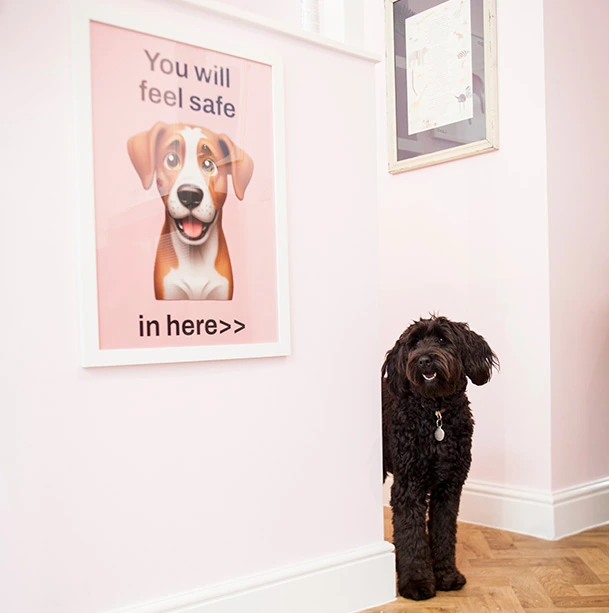Spaying females and castrating males are the most common surgical procedures we routinely undertake. There are advantages and disadvantages to both procedures.

Spaying females and castrating males are the most common surgical procedures we routinely undertake. There are advantages and disadvantages to both procedures.
Castration is the removal of the testicles through a relatively small single incision. After their removal the incision is repaired with stitches under the skin so that there’s nothing to lick. Medical ‘superglue’ is usually added to the suture line. The dog goes home later that day with pain control medication to obliterate any post surgical discomfort. Most dogs want to resume their normal routines the next day but exercise needs to be controlled (that means no off-lead exercise) until a week later when the wound has completely repaired.
Reasons for castrating male dogs are mostly social rather than medical. The neutered male dog population doesn’t live any longer, on average, than the not neutered population. That’s because life-threatening conditions involving the male reproductive organs – malignant cancers or uncontrollable hormonal or microbial conditions – are uncommon. Specifically, malignant testicular or prostate cancers are rare in dogs compared to in men.

There simply aren’t good scientific studies on the effects of castration but anecdotally, castration may prevent or improve three behaviours; male to male aggression, excessive urine marking and ‘vagrancy’, the inclination to disregard commands because there’s a great female scent that’s more interesting than you are. There is no evidence that trainability is affected by neutering.
Anecdotally, we are told that some small breeds are more inclined to urine mark than their larger compatriots. We don’t know if this is true but it’s a common reason we are asked to neuter them. Individual dogs that are naturally highly impulsive are more likely to engage in aggressive behaviour than are others. There are published comparisons of impulsivity according to breed but these are comparisons of populations and don’t apply to individual dogs. We help you make your decision according to your dog’s personality. For example, if your dog is impulsively fearful, castration could possibly make the behaviour more problematic.
Neutering considerably reduces the risk of ‘benign prostatic hyperplasia’, an age-related enlargement of the prostate that interferes with urinating. Castration is sometimes the treatment of choice for that condition.

In one out of every three or four dogs, castration alters energy balance enough to lead to weight gain unless the energy level of the diet is reduced. If your dog is castrated we recommend reducing the quantity of food anywhere from 10 to 20 per cent, or switching to a ‘neutered dog’ variety of food.
Neutering eliminates male odour. We have been told by some people that after neutering, their dogs (often large dogs such as Labradors) become interesting to intact male dogs and get humped. Mounting behaviour is certainly reduced after a dog is neutered although when dogs are socially conflicted they will still mount other dogs. Mounting doesn’t seem to be a problem either for the humper or the humpee but it’s embarrassing for some owners.
Castration does not reduce territory guarding so it has little or no effect on a dog’s inclination to guard your home. It does not affect play behaviour or, if it does, the effect is to increase interest in play with people.


Whether or not to castrate male dogs is as much a cultural decision as it is a medical one. In North America it’s the norm. In southern Europe it’s unusual. Northern European culture, including ours, tends more towards the American approach.
Our advice is that male hormone can be beneficial as well as a nuisance. We don’t suggest universal neutering of all male dogs but rather that you carry out a ‘wait and see’ approach.
Always friendly and super patient. Always willing to help, and willing to take the extra mile. Never over charge for anything. Very understanding and always shows support. Love the fact london vet clinic is involving animals charity works too.
Julie
Bruce Fogle and his excellent team have always gone above and beyond to care for my bouncy Betty. There have been some pretty hairy situations (including what turned out to be a swallowed ball) – and somehow the team remain calm, professional, and deliver the best care. The team have excellent bedside manner – explaining everything in clear detail whilst holding my hand and Betty’s paw. I’m forever grateful.
Alice B-B
Very trustworthy and warmhearted doctors and nurses. We still take our dog here even when we moved out of this area. They are the best.
Sarah Guez-Sadatomo
The best vet I have ever been. The staff are so nice and attentive. My dog loves going there, whichever of the doctors or the nurses are on duty the atmosphere is always so welcoming and nice. Next year will be my 10th year as a client.
Jenny P
When we had to let our beautiful dog Jazz go, the care & compassion shown by everyone at this clinic was beyond amazing. I will be forever grateful for the care they gave to Jazz for nearly 15 years. Highly recommend this practice
Steve Sutton
When we had to let our beautiful dog Jazz go, the care & compassion shown by everyone at this clinic was beyond amazing. I will be forever grateful for the care they gave to Jazz for nearly 15 years. Highly recommend this practice
Susan Flaherty